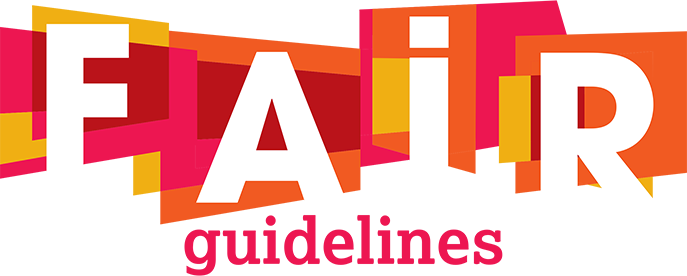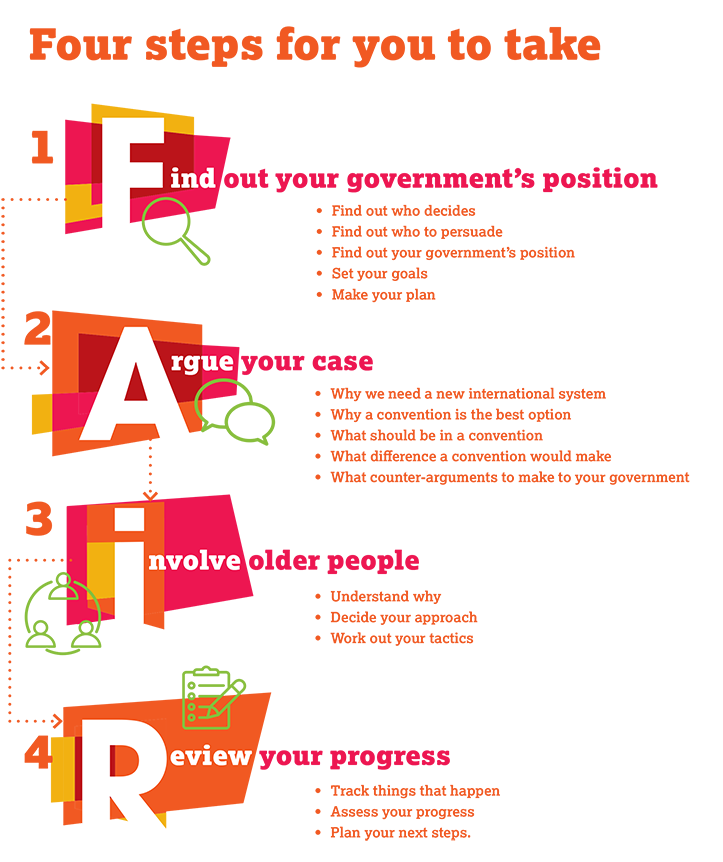
A new set of guidelines for civil society organisations wishing to influence their governments to support a convention has been launched today.
We all want to live in a fair and just society – a society where we can lead dignified lives when we get older. The absence of an international system on the rights of older people results in gaps in regional and national laws. A convention would clarify states’ responsibilities towards older people, provide the basis for public education, and generate financial resources for programmes and interventions to support older people. But how do we get governments to listen?
The new FAIR guidelines are organised as four “steps” towards a new convention, helping organisations navigate their advocacy journey with practical tips and clear milestones. Think of the word “fair” to remember the four steps:
Find out your government’s position. This step helps you understand the key information you need at the start of your journey, and how you can find what you are looking for, set your goals and make a plan.
Argue your case. A UN convention would transform older people’s lives, but how can we prove this to governments? This step provides effective ways to explain why we need a convention, including arguments your government might use against a convention and ways you can counter them.
Involve older people. Older people are the most effective advocates for their rights. They speak from experience and their voice can be very powerful. This step is about exploring different ways to engage with older people and work together to build your case.
Review your progress. It’s important to take stock of events from time to time. Here you will find some tips on how to track your progress, so you can see how far you have come and whether you are on the right track or need to adjust your plans.  By following these steps, organisations will build up evidence base relevant to their country, engage with older people more effectively and find the right strategy to bring their governments on board.
By following these steps, organisations will build up evidence base relevant to their country, engage with older people more effectively and find the right strategy to bring their governments on board.
These guidelines can be used at any stage of your journey, whether you are new to advocacy, find yourself stuck in a certain point, or are already an expert and would like to up your game.
How the FAIR guidelines have helped our network
HelpAge Global Network member the Vietnam Association of the Elderly wanted to know where the power lay in the government for deciding whether to support a UN convention. They found that it lay with the Prime Minister. So the next question was: who could influence the Prime Minister?
Here is where it become interesting. The answer led them to ask the Vietnam National Committee on Ageing to ask the Ministry of Labour, Invalids and Social Affairs to request the Deputy Prime Minister to ask the Ministry of Foreign Affairs to participate in a session of the Open-Ended Working Group on Ageing and express its support for a convention!
It may seem like a long and indirect route, but it worked. In 2015, a delegation from the Vietnamese Permanent Mission to the UN in New York attended the sixth session of the Open-ended Working Group and made a strong statement in support of a convention.
“Governments often tell us that it is pressure from civil society that makes them act. These guidelines will play an important role in empowering organisations to influence their governments to support a convention”, said Bridger Sleap, Senior Rights Policy Adviser at HelpAge International.

 By following these steps, organisations will build up evidence base relevant to their country, engage with older people more effectively and find the right strategy to bring their governments on board.
By following these steps, organisations will build up evidence base relevant to their country, engage with older people more effectively and find the right strategy to bring their governments on board.